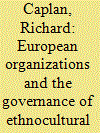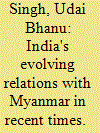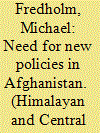|
|
|
Sort Order |
|
|
|
Items / Page
|
|
|
|
|
|
|
| Srl | Item |
| 1 |
ID:
142894


|
|
|
|
|
| Summary/Abstract |
In his 1988 essay, my late father, Yusif Sayigh, argued that the first Palestinian intifada had generated greater international understanding of the decades-long Palestinian struggle for national self-determination and support for the creation of an independent Palestinian state. This built on incremental shifts that had unfolded in response to diverse developments over the previous two decades, from the rise of the non-aligned movement in the 1970s, which helped secure a platform for the Palestine Liberation Organisation at the United Nations, to the grinding two-month Israeli siege of Beirut in 1982 and subsequent massacre of Palestinian refugees in the Sabra/Shatila camp. These developments galvanized Palestinians living under Israeli occupation in the West Bank, Gaza Strip, and East Jerusalem politically, and generated serious questioning of the feasibility of maintaining the occupation among many Israelis. But their cumulative impact was insufficient, in my father’s assessment, to bring about a decisive breakthrough in United States or, for that matter, in European policy.
|
|
|
|
|
|
|
|
|
|
|
|
|
|
|
|
| 2 |
ID:
133959


|
|
|
|
|
| Publication |
2014.
|
| Summary/Abstract |
The post-Cold War period to date has witnessed renewed international and especially European preoccupation with issues pertaining to ethnocultural diversity and the challenges for governance arising from these issues. This article discusses the shift that has occurred in support of national minority rights in Europe and why European organizations have become more concerned with these rights after the Cold War. It examines some of the major policy initiatives adopted by European organizations in response to the nearly 25-year long Yugoslav crisis and what these initiatives reveal about new (and old) thinking within these organizations with respect to national minority rights and the management of ethnocultural diversity more generally. It also discusses the consequences of these initiatives for minority rights protection and some of their broader implications for European policy in the future.
|
|
|
|
|
|
|
|
|
|
|
|
|
|
|
|
| 3 |
ID:
076524


|
|
|
|
|
| Publication |
2007.
|
| Summary/Abstract |
Tony Blair's decision to provide an indication of his departure date from 10 Downing Street has generated interest in the policies and style of his most likely successor, the current UK Chancellor of the Exchequer, Gordon Brown. Brown's ambitions for European policy are considered by a number of commentators to be less clear. This is because so far he has not produced a comprehensive vision of how he sees the UK's future relationship with the EU. However, as this article demonstrates, close examination reveals that his position on many aspects of European policy is actually already well documented.
|
|
|
|
|
|
|
|
|
|
|
|
|
|
|
|
| 4 |
ID:
104893


|
|
|
|
|
| Publication |
2011.
|
| Summary/Abstract |
The contribution of biofuels to the saving of greenhouse gas (GHG) emissions has recently been questioned because of emissions resulting from land use change (LUC) for bioenergy feedstock production. We investigate how the inclusion of the carbon effect of LUC into the carbon accounting framework, as scheduled by the European Commission, impacts on land use choices for an expanding biofuel feedstock production. We first illustrate the change in the carbon balances of various biofuels, using methodology and data from the IPCC Guidelines for National Greenhouse Gas Inventories. It becomes apparent that the conversion of natural land, apart from grassy savannahs, impedes meeting the EU's 35% minimum emissions reduction target for biofuels. We show that the current accounting method mainly promotes biofuel feedstock production on former cropland, thus increasing the competition between food and fuel production on the currently available cropland area. We further discuss whether it is profitable to use degraded land for commercial bioenergy production as requested by the European Commission to avoid undesirable LUC and conclude that the current regulation provides little incentive to use such land. The exclusive consideration of LUC for bioenergy production minimizes direct LUC at the expense of increasing indirect LUC.
|
|
|
|
|
|
|
|
|
|
|
|
|
|
|
|
| 5 |
ID:
091838


|
|
|
|
|
| Publication |
2009.
|
| Summary/Abstract |
Relation with Myanmar will continue to hold significance for India. India's Myanmar policy has been influenced by the desire to balance the geopolitical imperative with its commitment to democracy.
|
|
|
|
|
|
|
|
|
|
|
|
|
|
|
|
| 6 |
ID:
128373


|
|
|
|
|
| Publication |
2011.
|
| Summary/Abstract |
A decade has passed since the defeat of the Taliban government in Afghanistan, and it is hardly surprising that several member-states of the International Security Assistance Force (ISAF) wish to pull out their military forces from Afghanistan, or have already decided to do so. Yet, at first glance not even one of Afghanistaifs multiple problems appears to have been resolved. The Taliban insurgents remain a viable force, and violence regularly occurs throughout the country. The casual observer may well wonder whether the security assistance provided by the international coalition has been of any use at all. Indeed, the ISAF members in many ways appear to have followed contradictory and self-defeating policies in their valiant attempt to remake war-tom Afghanistan into a Western democracy overnight. While not all their efforts have been in vain, more could have been achieved if the realities of Afghanistan had been better understood by those who formulated ISAF policy. The reason for this failure in understanding the Afghan human landscape would seem to depend on two factors: first, an emphasis on do-good policies that included the immediate
introduction of democracy under a strong, central government - which appealed to Western voters but had already been proven futile or outright misguided in almost a century of Afghan attempts at state and nation-
building; second, the lack of a properly focused intelligence effort in Afghanistan, with sufficient resources and the goal to monitor conditions in the country instead of a single-minded focus on targeting in support
of actions against individual terrorists ("the War on Terror"). Or, put in different terms: while Westem military might initially was successfully brought to bear on the Taliban movement, the brain of the military was.
|
|
|
|
|
|
|
|
|
|
|
|
|
|
|
|
| 7 |
ID:
132631


|
|
|
|
|
| Publication |
2014.
|
| Summary/Abstract |
Municipal solid waste (MSW) collection and disposal is a major urban environment issue in the world today. MSW management solutions have to be technologically feasible, legally and socially acceptable and environmentally and financially sustainable. European policy is pushing for a rational management of natural resources; a promising technological perspective today is waste valorisation, a process that involves sorting at the source, combined with material recycling and waste-to-energy conversion. In this paper, we analyze the evolution of the Portuguese MSW management system, criticize the environmental policy issues for MSW management in Portugal and identify weak points in the criteria used for the technologies selection. Portugal is facing multiple problems with MSW management and is attempting to tackle them by passing legislation in order to improve the performance of waste management systems. At the technological level, gasification increasingly presents as an efficient and viable alternative to incineration. Gasification is a waste-to-energy conversion scheme that offers an attractive solution to both waste disposal and energy problems. Waste gasification by plasma has been validated but the economic viability of this technology must be proven before to be accepted by the industry.
|
|
|
|
|
|
|
|
|
|
|
|
|
|
|
|
| 8 |
ID:
104665


|
|
|
| 9 |
ID:
109376


|
|
|
|
|
| Publication |
2011.
|
| Summary/Abstract |
In Europe, environmental and economic considerations are driving a revolution in power transmission and distribution. Specifically of interest to this paper, utility companies are increasingly using information and communication technology (ICT) to increase the efficiency and reliability of the grid, as well as to incorporate smaller-scale sources of intermittent wind and solar power into our electricity supply. This should have a positive effect on Europe's energy policy objectives. However, developments in the field of international security have made clear that increased reliance on ICT within the electricity sector will create new vulnerabilities that may undermine these gains.
This paper argues that the European Union (EU) has the opportunity to mitigate these vulnerabilities by virtue of its strengthening regulatory position in the European market, and its record of promoting energy technology research. However, the organization will need to act now in recognizing that cyber security as an essential dimension of its energy policy. This paper recommends that the Commission acts now to appoint a coordinator to accelerate the adoption of sensitive institutional changes in this vein. It also suggests that the EU would benefit from cooperation with the United States-a country with strong cyber capabilities that would complement the European program.
|
|
|
|
|
|
|
|
|
|
|
|
|
|
|
|
|
|
|
|
|